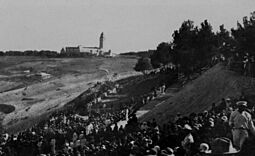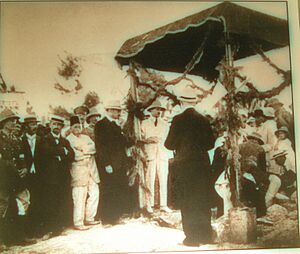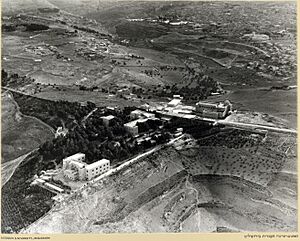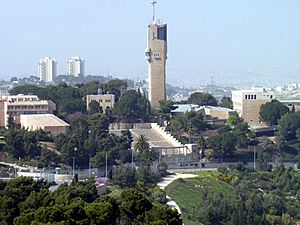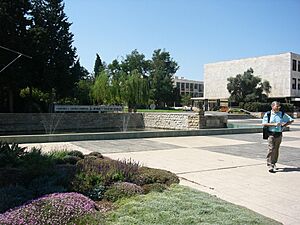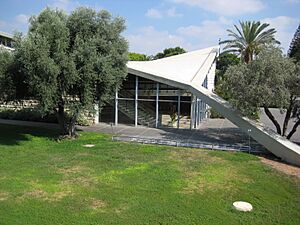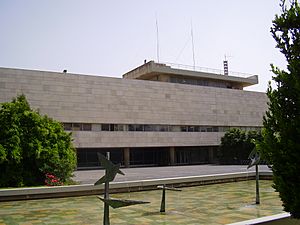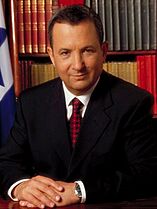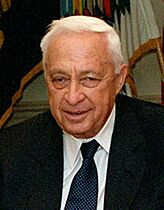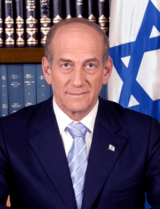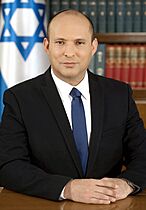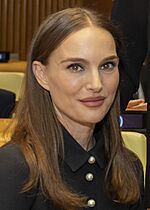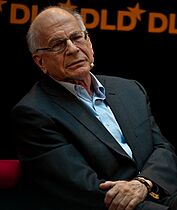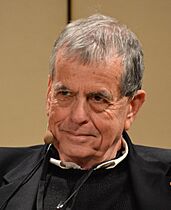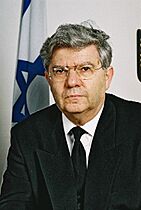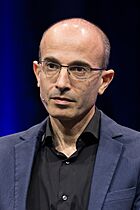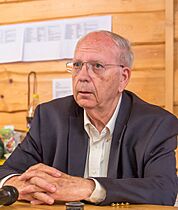Hebrew University of Jerusalem facts for kids
|
האוניברסיטה העברית בירושלים
|
|
 |
|
| Type | Public research |
|---|---|
| Established | 24 July, 1918 |
| Founders | Albert Einstein, Chaim Weizmann |
| Endowment | US$515.4 million (2018) |
| Budget | US$802.4 million (2018) |
| President | Asher Cohen |
| Rector | Tamir Sheafer |
|
Academic staff
|
1,200 tenured faculty |
|
Administrative staff
|
1,500 |
| Students | 23,000 |
| Undergraduates | 12,500 |
| Postgraduates | 5,000 |
| 2,200 | |
| Location |
Jerusalem and Rehovot
,
Israel
|
| Campus | Urban |
| Nickname | HUJI, Hebrew U |
 |
|
The Hebrew University of Jerusalem (often called HUJI) is a public research university in Jerusalem, Israel. A public university is open to everyone, and a research university is a place where students and professors make new discoveries.
It was co-founded by famous scientist Albert Einstein and future first president of Israel Chaim Weizmann. The first stone was laid in 1918, making it the second-oldest university in Israel. It opened its doors about 30 years before Israel became a country.
The university has five hospitals where students learn, seven main departments called faculties, and over 100 research centers. It has campuses in Jerusalem and other Israeli cities. Until 2023, it was home to the world's largest library for Jewish studies, the National Library of Israel.
Many important people have been connected to the university. Four of Israel's prime ministers studied there. As of 2018, 15 Nobel Prize winners and many other award-winning scholars have taught or studied at HUJI. It is often ranked as one of the best universities in the world.
Contents
History
The Dream of a University
For many years, members of the Zionist movement dreamed of creating a Jewish university in the Land of Israel. The idea was discussed as early as 1884.
The first cornerstone for the university was laid on July 24, 1918. Seven years later, on April 1, 1925, the university's campus on Mount Scopus officially opened. The ceremony was a big event attended by important leaders and scholars from around the world, including Lord Balfour and Winston Churchill.
One of the first big decisions was choosing the official language for teaching. Some people wanted to use German, but others felt it was important to use the newly revived Hebrew language. In the end, they decided the university would be a center for Hebrew learning and culture.
Growth and Challenges
By 1947, the university had grown into a major center for teaching and research. It added a medical school and a law school in 1949.
During the 1948 Arab–Israeli War, it became difficult to travel safely to the university on Mount Scopus. After a tragic attack on a medical convoy, the campus was cut off from the rest of Jerusalem. For a while, the university had to hold classes in 40 different buildings all over the city.
Because they couldn't reach Mount Scopus, a new campus was built in a neighborhood called Givat Ram and was finished in 1958.
After the Six-Day War in 1967, Jerusalem was reunified, and the university was able to return to its original Mount Scopus campus. The campus was rebuilt and expanded, and by 1981, it was once again the main campus of the university.
On July 31, 2002, a bomb was detonated in the university's cafeteria. Nine people were killed and many more were hurt. Leaders from all over the world condemned this terrible act.
University Campuses
The Hebrew University has several campuses, each with a special focus.
Mount Scopus
The main campus is on Mount Scopus in northeastern Jerusalem. This is where you can find faculties for Humanities (like history and literature), Social Sciences (like politics and sociology), Law, and Business. It is also home to the Rothberg International School, which welcomes students from all over the world.
Student housing, called dormitories, are located right on campus, making it a lively place for students to live and study.
Edmond J. Safra Campus (Givat Ram)
The Givat Ram campus is home to the Faculty of Science. This includes the famous Einstein Institute of Mathematics and centers for studying life sciences and the brain. The National Library of Israel was also located here for many years.
Ein Kerem
The Ein Kerem campus is the medical center of the university. It is located next to the Hadassah-University Medical Center. This is where students in the Faculties of Medicine and Dental Medicine learn and conduct research.
Rehovot
In the city of Rehovot, the university has its Robert H. Smith Faculty of Agriculture, Food and Environment. This is where students learn about farming, food science, and how to care for the environment. The Koret School of Veterinary Medicine, which opened in 1985, is also located here.
University Libraries
The university has an amazing system of libraries with millions of books and documents.
The National Library of Israel
The Jewish National and University Library was the central library of the university and is now the National Library of Israel. It was founded in 1892, even before the university itself. Its goal is to collect and protect books and manuscripts related to Jewish culture and history. It has the world's largest collection of books written in Hebrew and about Jewish topics.
The library also holds the personal papers of Albert Einstein. When he died, he left all his writings to the university. The Albert Einstein Archives contain about 55,000 items, including his scientific notes and personal letters. The entire collection has been digitized so people can see it online.
Other Libraries
Besides the National Library, each campus has its own libraries for different subjects. There are special libraries for science, law, medicine, archaeology, and more. This makes it easy for students and professors to find the information they need for their studies.
University Rankings
| University rankings | |
|---|---|
| Global – Overall | |
| ARWU World | 81 (2024) |
| CWTS World | 219 (2024) |
| QS World | =240 (2025) |
| THE World | 301-350 (2025) |
| USNWR Global | 271 (2025) |
The Hebrew University is often called the top university in Israel. According to the Academic Ranking of World Universities, it is one of the best 150 universities in the world. It is especially famous for its programs in mathematics, computer science, and business. For many years, it has been ranked among the top 25 universities in the world for mathematics.
Turning Research into Reality
The university has a special company called Yissum that helps turn ideas from research into real products and companies. Yissum was founded in 1964.
Since then, it has helped create over 80 companies based on inventions from the university's professors and students. Some famous companies that started with help from Yissum include Mobileye, which makes technology for self-driving cars, and OrCam, which creates devices to help visually impaired people.
Famous People from the University
Many leaders, scientists, and artists have studied or taught at the Hebrew University.
- Notable Hebrew University alumni and faculty include:
-
10th Prime Minister of Israel Ehud Barak
-
11th Prime Minister of Israel Ariel Sharon
-
12th Prime Minister of Israel Ehud Olmert
-
13th Prime Minister of Israel Naftali Bennett
-
Academy Award-winning actress Natalie Portman
-
Former President of the Supreme Court of Israel Aharon Barak
-
Historian and bestselling author Yuval Noah Harari
-
Former Director of Mossad Ephraim Halevy
See also
 In Spanish: Universidad Hebrea de Jerusalén para niños
In Spanish: Universidad Hebrea de Jerusalén para niños
- Einstein Papers Project
- Yehezkel Kaufman
- List of Israeli universities and colleges
Images for kids
-
The building of Academy of the Hebrew Language, Givat Ram. The AHL replaced in 1953 the Hebrew Language Committee, established in 1890.
 | John T. Biggers |
 | Thomas Blackshear |
 | Mark Bradford |
 | Beverly Buchanan |


